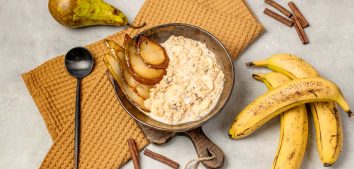
The Impact of Diet on Mood in Winter: What Products Will Help Avoid the Winter Blues?
Winter months can be a challenge as there is much less sunlight, the days are short, and it gets unpleasantly cold. As a result, we often feel tired and our mood can be low. I have noticed that at this time of year, I need support for my body and mind more than usual. And although we know that exercise and contact with nature are key (read about it here), diet also plays a huge role in how we feel. That is why I want to share with you today what nutrients can help improve your mood and boost your energy in winter.
How Does Food Affect Our Mood?
What we eat affects many processes in our body. The brain, or the command center of the entire body, needs the right fuel to function efficiently. Nutritional deficiencies can disrupt its functioning by affecting the production of neurotransmitters such as serotonin and dopamine. These happiness hormones are responsible for regulating mood, energy and motivation.
Scientific studies confirm that people who follow the Mediterranean diet, rich in healthy fats, vegetables and whole grains, are less likely to struggle with symptoms of depression. In turn, a diet poor in vitamins and minerals, based on highly processed products, can intensify poor well-being and lower mood. So let’s take a look at which nutrients are crucial for our mood and how we can introduce them into our daily diet.
What Should You Include in Your Diet?
1. Omega-3 Fatty Acids – Support for Mental Health
Omega-3 fatty acids belong to the most important nutrients that support brain function. It helps produce serotonin, which acts as a natural antidepressant.
You can find them in oily sea fish (salmon, mackerel, sardines), as well as in plant sources such as flax seeds, chia seeds or walnuts. Try to include them in your diet at least 2–3 times a week to strengthen the functioning of the nervous system.
2. B vitamins – Energy and Better Mood
Vitamins B6 and B12 are invaluable in processes related to the production of neurotransmitters. Deficiencies in these vitamins can lead to low mood, fatigue, and irritability.
Good sources of B vitamins include whole grains, eggs, leafy vegetables, nuts, and seeds. Interestingly, studies show that vitamin B12 can also help reduce symptoms of depression in people who are deficient in it.
3. Magnesium – a Remedy for Stress
Magnesium is an element that helps regulate the nervous system. Its deficiency can lead to irritability, anxiety, and even sleep disorders.
Fortunately, it can be found in many delicious products, such as spinach, almonds, pumpkin seeds, dark cocoa, and bananas. Who doesn’t like a cup of hot cocoa on a winter evening? It’s not only a pleasure, but also a great way to provide your body with magnesium.
4. Probiotics – Healthy Intestines, Healthy Head
Did you know that our gut is called the second brain? A healthy gut microbiota supports serotonin production and affects our mood.
Include sauerkraut, lacto-fermented cucumbers, kefir, natural yogurt or miso in your diet to strengthen your gut health and thus improve your well-being.
5. Polyphenols – Mood Support
Polyphenols are plant compounds with strong antioxidant effects that support the nervous system and increase serotonin and dopamine levels in the brain.
You can find them in berries, vegetables, cocoa, coffee and tea. A cup of green tea or a piece of dark chocolate is a tasty way to improve your well-being!
Sample Recipes to Improve your Mood
Breakfast: Apple pancakes with cinnamon and almonds – you can find the recipe here.
Lunch: Shakshuka with Parma ham and avocado — find the recipe here.
Snack: Banana and Spinach Smoothie – find the recipe here..
Dinner: Cream of broccoli soup with pumpkin seeds – find the recipe here.
If you need more inspiration, check out the Diet & Training by Ann app. There are plenty of simple recipes and practical tips that will make it easier to take care of your health every day and will help you significantly improve your well-being!
Small Changes, Big Impact
Diet is not a substitute for professional treatment, but it can be an important support. Daily food choices are of great importance for our well-being and mental health. It is not about perfection, but about small, conscious changes introduced step by step.
Take care of yourself, listen to your body and remember that it is not selfishness, but a long – term investment in your health and happiness. I keep my fingers crossed for you!
Bibliography
- Benton, D., & Donohoe, R. T. (2011). The influence of nutrients on mood. Public Health Nutrition, 14(12), 1–8.
- Bizzozero-Peroni, B., Martínez-Vizcaíno, V., Fernández-Rodríguez, R., Jiménez-López, E., Núñez de Arenas-Arroyo, S., & Mesas, A. E. (2024). Mediterranean diet and depressive symptoms: A meta-analysis. Nutrition Reviews. Advance online publication.
- Parker, G., Gibson, N. A., Brotchie, H., Heruc, G., Rees, A. M., & Hadzi-Pavlovic, D. (2006). Omega-3 fatty acids and mood disorders. American Journal of Psychiatry, 163(6)
- Selhub, E. M., Logan, A. C., & Bested, A. C. (2014). Fermented foods, microbiota, and mental health. Journal of Physiological Anthropology, 33(2)
- Murakami, K., & Sasaki, S. (2010). Dietary intake and depressive symptoms: A systematic review of observational studies. Molecular Nutrition & Food Research, 54(4)










Comments No Comments
Join the discussion…